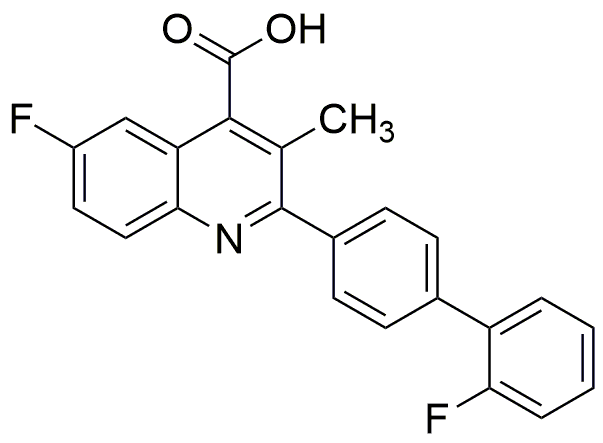Brequinar is widely utilized in research focused on:
- Antiviral Research: Brequinar has shown potential as an antiviral agent, particularly in studies targeting viral replication mechanisms. Its unique structure allows it to inhibit specific enzymes, making it valuable in developing treatments for viral infections.
- Cancer Therapy: This compound is being explored for its ability to inhibit cell proliferation in various cancer types. Researchers are investigating its effectiveness in combination therapies to enhance the efficacy of existing cancer treatments.
- Immunosuppressive Applications: Brequinar has been studied for its immunosuppressive properties, which can be beneficial in organ transplantation and autoimmune disease management. By modulating immune responses, it helps in reducing the risk of rejection in transplant patients.
- Biochemical Research: As a tool in biochemical studies, Brequinar is used to investigate metabolic pathways and enzyme activities. Its specific interactions with cellular components make it a useful reagent in laboratory settings.
- Drug Development: The compound serves as a lead structure in drug discovery programs, allowing researchers to modify its chemical properties to enhance potency and reduce side effects. This adaptability makes it a significant candidate in pharmaceutical development.
General Information
Properties
Safety and Regulations
Applications
Brequinar is widely utilized in research focused on:
- Antiviral Research: Brequinar has shown potential as an antiviral agent, particularly in studies targeting viral replication mechanisms. Its unique structure allows it to inhibit specific enzymes, making it valuable in developing treatments for viral infections.
- Cancer Therapy: This compound is being explored for its ability to inhibit cell proliferation in various cancer types. Researchers are investigating its effectiveness in combination therapies to enhance the efficacy of existing cancer treatments.
- Immunosuppressive Applications: Brequinar has been studied for its immunosuppressive properties, which can be beneficial in organ transplantation and autoimmune disease management. By modulating immune responses, it helps in reducing the risk of rejection in transplant patients.
- Biochemical Research: As a tool in biochemical studies, Brequinar is used to investigate metabolic pathways and enzyme activities. Its specific interactions with cellular components make it a useful reagent in laboratory settings.
- Drug Development: The compound serves as a lead structure in drug discovery programs, allowing researchers to modify its chemical properties to enhance potency and reduce side effects. This adaptability makes it a significant candidate in pharmaceutical development.
Documents
Safety Data Sheets (SDS)
The SDS provides comprehensive safety information on handling, storage, and disposal of the product.
Product Specification (PS)
The PS provides a comprehensive breakdown of the product’s properties, including chemical composition, physical state, purity, and storage requirements. It also details acceptable quality ranges and the product's intended applications.
Certificates of Analysis (COA)
Search for Certificates of Analysis (COA) by entering the products Lot Number. Lot and Batch Numbers can be found on a product’s label following the words ‘Lot’ or ‘Batch’.
Numéro de catalogue
Numéro de lot/série
Certificates Of Origin (COO)
This COO confirms the country where the product was manufactured, and also details the materials and components used in it and whether it is derived from natural, synthetic, or other specific sources. This certificate may be required for customs, trade, and regulatory compliance.
Numéro de catalogue
Numéro de lot/série
Safety Data Sheets (SDS)
The SDS provides comprehensive safety information on handling, storage, and disposal of the product.
DownloadProduct Specification (PS)
The PS provides a comprehensive breakdown of the product’s properties, including chemical composition, physical state, purity, and storage requirements. It also details acceptable quality ranges and the product's intended applications.
DownloadCertificates of Analysis (COA)
Search for Certificates of Analysis (COA) by entering the products Lot Number. Lot and Batch Numbers can be found on a product’s label following the words ‘Lot’ or ‘Batch’.
Numéro de catalogue
Numéro de lot/série
Certificates Of Origin (COO)
This COO confirms the country where the product was manufactured, and also details the materials and components used in it and whether it is derived from natural, synthetic, or other specific sources. This certificate may be required for customs, trade, and regulatory compliance.


